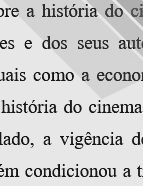

................................
The evolution of the historiographical practices around Portuguese cinema was gradual and too slow, from the first proto-historiographical writings by pseudo-authors and journalists, with their memorialistic or assumedly subjective styles. The arrival of the object to the academy, generalised in the 21st century, paved the way for the problematisation of undisputed questions and for opening up the debate on fields and genres that had been undervalued or even ignored, such as the production of scientific, industrial, and tourist cinema, among others, the relationship between cinema and political and economic power, and, more recently, the studies on Portuguese cinema that adopt post-colonial and feminist perspectives, among others.
Primary references: BAPTISTA, Tiago, A Invenção do Cinema Português, Lisboa, Tinta da China, 2008; BARROSO, Eduardo Paz, Justificação e Crítica do Cinema Português Anos 60/Anos 70, Lisboa, doctorate dissertation submitted to FCSH/UNL, 2002; COSTA, Henrique Alves, Breve História da Imprensa Cinematográfica Portuguesa, Porto, Clube Português de Cinematografia, 1954; COSTA, João Bénard da, Histórias do Cinema, Lisboa, Imprensa Nacional Casa da Moeda, 1991; CUNHA, P. e SALES, M. (org.), Cinema Português: Um Guia Essencial, São Paulo, SESI-SP, 2013; CUNHA, Paulo, “Para uma história das histórias do cinema português”. Aniki: Revista Portuguesa da Imagem em Movimento [Online], vol. 3, no. 1, 2016. [Accessed 20 November 2018]. Available at WWW: <URL: http://aim.org.pt/ojs/index.php/revista/article/viewFile/231/pdf>; DUARTE, Fernando, Elementos para a História do Cinema Português, do livro e a imprensa cinematográfica e do cineclubismo, Rio Maior, Ed. Celulóide, 1976; PELAYO, Jorge, Bibliografia Portuguesa de Cinema. Uma visão cronológica e analítica, Lisboa, Cinemateca Portuguesa, 1998; PINA, Luís de, A Aventura do Cinema Português, Lisboa, Editorial Vega, 1977; TORGAL, Luís Reis (coord.), O Cinema sob o olhar de Salazar, Lisboa, Círculo de Leitores, 2001.
Paulo Cunha
